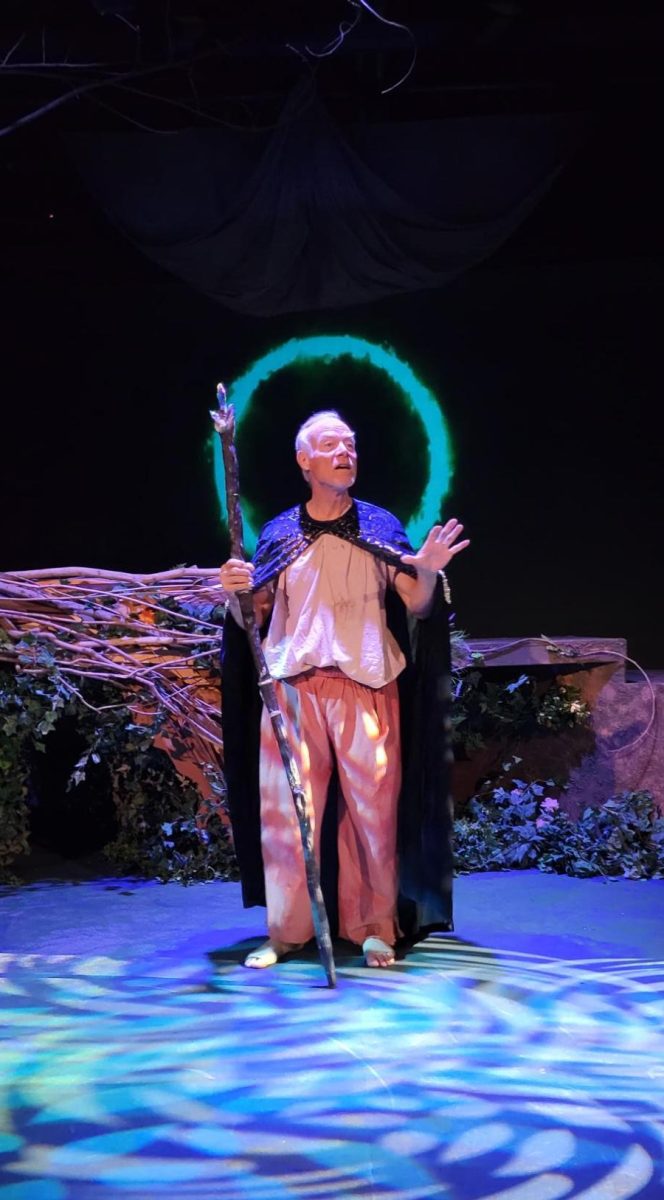The Mesa College Theatre Company’s latest production of William Shakespeare’s, “The Tempest” undertook this uniquely magical play head-on. The unusually large cast of 18 was headlined by a non-traditional student and community member Geoffrey Graeme, in what he characterized as his “dream role,” playing the principal role of Prospero.
“This was a big show. We had a number of actors in the community that came to audition and were happy to join the process,” said director and theatre department chair George Yé.
The Mesa Theatre Company reveled in the themes of revenge, forgiveness, confinement, and love. “The Tempest” follows traditional Shakespearean thematic tropes and involves the ever-so-difficult language and intertwined characters and storyline.
Despite the difficulty the language presents Yé encouraged the audience to, “take a moment and align yourself with the language.” Luckily for the audience the true magic of the play is actually in the text. The professionalism and dedication to this piece was evident as the players transformed the Appoliad Theatre, with the help of the production team, into a remote island in the Mediterranean.
“This is one of the most successful productions we’ve done here at Mesa,” said production manager, Maya Aizenman. “It’s the most work, the most dedication, and one of the most creative projects we’ve done.”
The players begin aboard a ship, engulfed by a raging storm. The ship bears the Duke of Milan, Alonso, played by Miles Goering, and his court. From a nearby island, Prospero, the former Duke of Milan, and his daughter Miranda, played by Patricia Decosta, look on as the ship sinks.
Set supervisor Yí-Chíen Lee described the challenges of recreating a magical island and the prominence of a tree as the focal point on the stage. “In the beginning we were looking to find a tree that would set the scene about the magic on the island,” she explained. “The tree beautifies driftwood, the part of the boat and trying to recreate a realistic item on stage is tricky but by adding some artistic perspective it gives it some life.”
The story of life and freedom are prominent throughout the production. As a worried Miranda begs Prospero to calm the waters, Graeme in Prospero’s earliest monologues masterfully reveals to Miranda and the audience the details of their past, telling how, 12 years ago, his brother Antonio, played by Anthony Ralphs, betrayed and overthrew him. With the help of the Duke Alonso, Antonio arranged for Prospero and Miranda to be kidnapped and set adrift at sea. Prospero believes these fortunate circumstances have allowed him to take revenge on his enemies, and for this reason he has conjured the storm.

After a charm by Prospero puts Miranda to sleep, he then summons his spirit-servant Ariel. Ariel, played by Luna Camitan, assures Prospero that everyone aboard has made it to the island alive, but are scattered separately. Ariel asks to be release for doing his bidding, but Prospero angrily reminds the spirit that he saved her from the witch Sycorax (the previous ruler of the island). Ariel apologizes and follows Prospero’s orders and makes herself invisible in order to spy on the shipwrecked courtiers. After awakening Miranda, Prospero summons his servant Caliban, the son of Sycorax, played by Leonardo Romero. Caliban curses Prospero, and denies that he owes Prospero anything. Both characters are in the service of Prospero and despite being called “family,” seek to gain their freedom.
Meanwhile, Ariel, still invisible, leads Ferdinand Alonso’s son, played by Darien Adreas Brown, to Prospero. Ferdinand and Miranda fall in love immediately, but Prospero puts a spell on Ferdinand and takes control of him. The struggle for vengeance seems to outweigh all of Prospero’s willingness to subjugate anyone who stands in his way.
On another part of the island, Caliban encounters Alonso’s butler Stephano, played by Elizabeth Benson, and jester Trinculo, played wonderfully by Kateri Reape. Her incorporation of a kazoo to her character adds a merry and entertaining element, that surely was missed in Shakespeare’s day.
Caliban mistakes these two for gods because they give him wine and get him drunk.In a hilarious exchange of wits, which includes a lot of boot licking by Caliban, he persuades them to help him murder Prospero with the promise that he will serve them as lords of the island.

Back at Prospero’s cave, Prospero gives his blessing to Miranda and Ferdinand’s marriage. He summons spirits to perform an elaborate masque (dramatic performance) for the couple. This abrupt change to musical song was a dreamy escape from the plots of revenge and murder.
Suddenly, Prospero remembers Caliban’s plot to murder him. He quickly ends the masque and, with Ariel’s help, tricks and then chases off the three would-be murderers.
In the play’s final scene, Prospero, with Ariel’s counsel, decides that rather than taking revenge he will instead give up his magic and forgive his enemies. Alonso apologizes and relinquishes control of Milan. Alonso and Ferdinand are reunited, and Alonso gives his blessing to the marriage of Miranda and Ferdinand. Prospero summons Stephano, Trinculo, and Caliban and berates them. Caliban curses himself for mistaking them for gods. Prospero then charges Ariel to ensure a safe voyage back to Italy for all, and grants Ariel her freedom. The play ends with Prospero’s epilogue, in which he asks the audience to applaud and set him free. To which the audience merrily obliged.
In true Shakespearean fashion, all is resolved in love and war. The cast and crew of the Mesa Theatre Company undertook this ambitious task, mounting a full Shakespearean play and continuing to prove why the theater department at Mesa College is a viable place to collaborate and create compelling art.



Tony • May 11, 2024 at 11:00 am
Fantastic review!